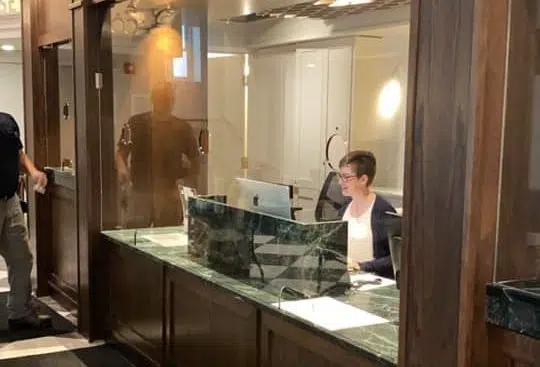
The Imperial Theatre's plexi-glassed ticket booth (Imperial Theatre Facebook)
The Imperial Theatre embraced new perspectives, strategies and opportunities in programming a unique 2020 season during the COVID-19 pandemic.
“I think it was about looking for the icing on an otherwise awful fruitcake,” said Executive Director Angela Campbell. “For us, it was such a wonderful experience to be able to refocus our mission and mandate to import artists to Atlantic Canada, and really focus on the incredible artists we have in Atlantic Canada and find a way to connect them to our community.”
Campbell and her team quickly decided to restructure their long-term programming, normally planned 12-to-24 months in advance, in three-month increments in order to accommodate for potential shutdowns.
“When you change your business model so drastically what it does is it creates this incredible opportunity for creating new systems, you think about how you do things in a different way,” she said.

Imperial Theatre’s lobby (Imperial Theatre Facebook)
The team also realized they were going to need to rely on digital technology for the foreseeable future and began fundraising early to invest in and purchase the proper digital equipment and became knowledgeable in its infrastructure.
“Our long-term strategy was to have a digital streaming infrastructure in place so that if we did have to take a step back, we could just flip the switch and be able to turn it on,” she said. “Luckily when we went to Orange [phase], we had finally received everything that we had been working to build.”
Mike Biggar’s Songs of the Season, featuring Jessica Rhaye, on December 5 was the first Imperial Theatre concert streamed and broadcasted live and was a huge leap forward in its ability to connect audiences and artists.
The Imperial Theatre also created its Incubator Pilot Project in June, providing locals artists with the space to rehearse and create new work.
The pandemic led the Imperial Theatre to cultivate its arsenal of skills and expertise, from learning to market shows under a much shorter lead up time to operating new technical equipment stream shows online.
The long-term, practical use of its broadcasting equipment could create new audiences, such as seniors living in assisted-care facilities.

Mike Biggar’s Songs of the Season concert, livestreamed by Imperial Theatre (Submitted)
“If we could deliver performances from our stage to them in the safety of their community room and they’re in their bubble, that would be something we would love to be able to do,” says Campbell. “I believe that there are audiences who are going to prefer to watch some performances from home and if we can make that happen, I think that it’s just going to increase accessibility and inclusivity.”
Campbell credits the Imperial Theatre’s success and innovation amidst COVID-19 to its incredibly creative dedicated team and believes society will have a greater appreciation of live entertainment than one had before the pandemic.
“Rose Cousins was the first live performance we did when we reopened and I cried three times introducing the show, I was so happy to be back,” she said.
The Imperial Theatre will continue focusing on showcasing local and Atlantic Canadian artists until Canada is further into the vaccination process. David Myles, Ron James and Dave Carroll are examples of the talent booked between January and March.
Overall Campbell is hopeful and excited for 2021, but believes it will take time to build audiences back up to filling the Imperial’s 850-seat capacity.
“It’s going to take time for people to feel comfortable against sitting in a room with that many people, but we’re really we’re ready to put in the work to get there – I think all of us have learned so much about this pandemic and how quickly our lives can change,” she said.






